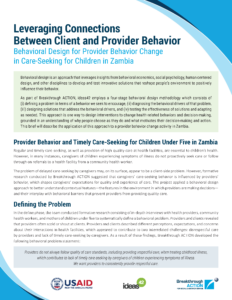Regular and timely care-seeking, as well as the provision of high-quality care at health facilities, are essential to children’s health. However, in many instances, caregivers of children experiencing symptoms of illness do not proactively seek care or follow through on referrals to a health facility from a community health worker. The problem of delayed care-seeking by caregivers may, on its surface, appear to be a client-side problem. However, formative research conducted by Breakthrough ACTION suggested that caregivers’ care-seeking behavior is influenced by providers’ behavior, which shapes caregivers’ expectations for quality and experience of care. The project applied a behavioral design approach to better understand contextual features—the features in the environment in which providers are making decisions— and their interplay with behavioral barriers that prevent providers from providing quality care.



